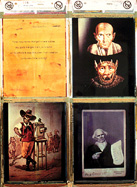The bibliophiles' reactions [to discussions of the future of
the book] are undeniably colored by fetishism, as witness their disproportionate
concern about the difficulty of curling up in bed with a computer [...].
But the enthusiasts of the new technology are not exactly innocent of fetishism
either, both for their sleek new toys and for the obsessive, idle manipulations
that they encourage. And it is probably these conflicting fetishisms that
lead both sides to adopt a particularly concrete and implacable variety
of technological determinism. They
assume not just that the future of discourse hinges entirely on the artifacts
that mediate it, but that artifacts and hence cultural epochs can only
supersede one another [...].
 I
saw poetry as a configuration of signs, and the pattern it traced was that
of dispersion. A poem: an
ideogram of a world seeking its meaning, its orientation, not in a fixed
point but in the rotation of points and in
the mobility of signs.
I
saw poetry as a configuration of signs, and the pattern it traced was that
of dispersion. A poem: an
ideogram of a world seeking its meaning, its orientation, not in a fixed
point but in the rotation of points and in
the mobility of signs.
The Library of Babel is not in London
or Paris but in Buenos Aires; its librarian, god, or ghost is named Jorge
Luis Borges. The Argentine writer discovers that all books are the same
book and that, "abominable as mirrors," they all repeat the same word.
I
saw poetry as a configuration of signs, and the pattern it traced was that
of dispersion. A poem: an
ideogram of a world seeking its meaning, its orientation, not in a fixed
point but in the rotation of points and in
the mobility of signs.